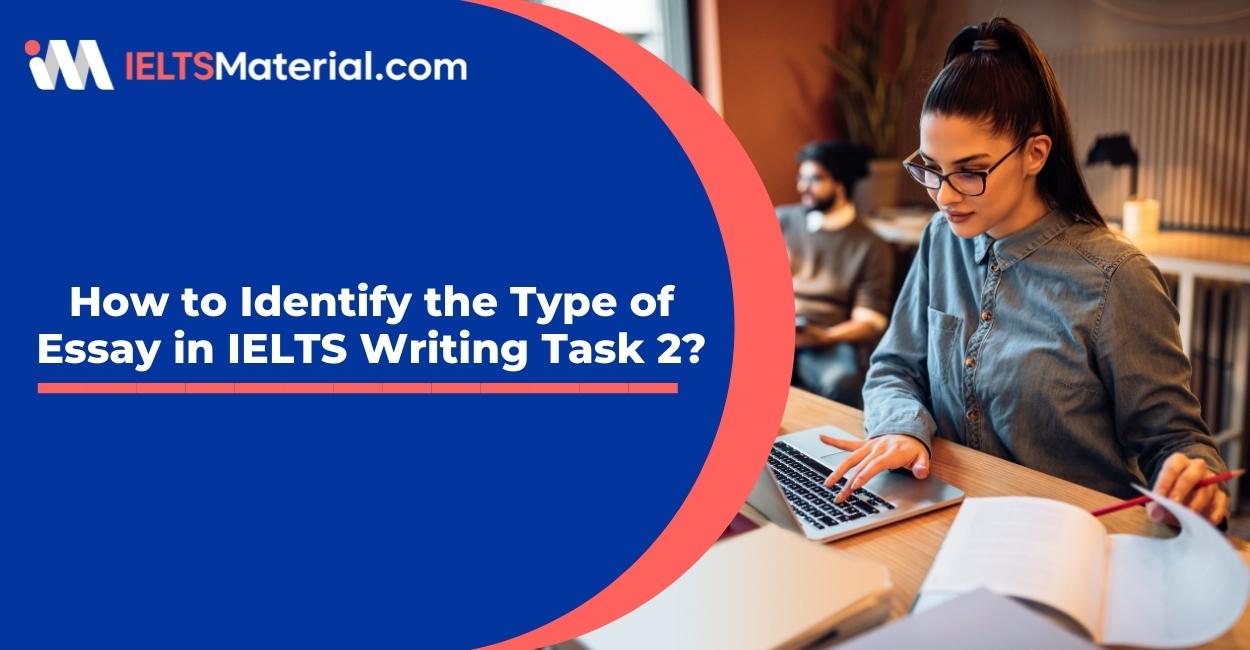How to Identify the Type of Essay in IELTS Writing Task 2?
4 min read
Updated On
-
Copy link
Table of Contents

Limited-Time Offer : Access a FREE 10-Day IELTS Study Plan!
Many students often find themselves in perplexing situations when it comes to identifying the essay type in the IELTS Writing task 2. There are various types of essays asked in Writing task 2. Hence many students find it difficult to distinguish which type of essay is opinion-based and which is not. So, let’s find out how to identify different types of essays and get some clarity on it
In IELTS Writing task 2, there are five different types of essays that can appear. Both General Training and Academic writing task 2 include these types of essays.
The 5 types of IELTS Essays are:
- Cause and Solution Essay
- Opinion Essay
- Advantage and Disadvantage Essay
- Discussion Essay
- Direct Essay
When it comes to IELTS Writing task 2, one of the most common mistakes students make is jumping into writing without carefully reading the question. So, it is essential to read the question carefully to comprehend it fully.
After you complete reading the essay question of IELTS Writing task 2, underline the part which contains the actual question. For example, if a cause and effect question is given to you, then highlight the keyword ‘cause and solution’. This would let you concentrate on the essay’s main point and the essay’s main topic. So, how to identify the essay types? Let us know using the following examples:
Cause and Solution Essay
| Water scarcity is a serious problem in many countries. What are the causes of this?And what solutions can be done by individuals and the government? |
The first part of the question would be a statement. After that, you’ll be asked to discuss the cause and give solutions.
Here are the points that you can address for the above question:
- State the cause clearly.
- Develop your arguments on the cause
- Make sure to link the cause to its solution
- Develop your arguments on its solution
Opinion Essay
| More and more people no longer read the newspaper or watch TV programs to get news. They get news about the world through the internet. Is this a positive or negative development? |
The first part of the question would be a statement. After that, you’ll be asked to give your opinion about the statement. There are words like agree/disagree, to what extent do you agree, whether positive or negative development and so on which help you to identify opinion essays.
Here are the points that you can address for the above question:
- Select one side.
- State your opinion clearly in the introduction.
- Maintain the same opinion throughout the essay.
- Give supporting arguments as to why you hold the opinion.
Advantage and Disadvantage Essay
| Today due to advanced medicine, people are living longer. Therefore, the number of elders is expected to exceed that of young people. Do the advantages of this development outweigh the disadvantages? |
The first part of the question would be a statement. After that, you’ll be asked to discuss both advantages and disadvantages of the statement.
Here are the points that you can address for the above question:
- State the advantages and develop your argument on them.
- State the disadvantages and develop your argument on them.
- Conclude your essay with your opinion and explain why you hold the opinion.
Discussion Essay
| Some people think in order to continually improve the quality of education, high school students should be encouraged to evaluate and criticize their teachers. Others feel that this would result in a loss of respect and discipline in the classroom. Discuss both these views and give your own opinion. |
The first part of the question would be a statement and, you have to address both sides of the argument. You will almost always be asked for your opinion as well.
Here are the points that you can address for the above question:
- Discuss both sides of the argument
- State your opinion clearly.
- Give supporting arguments for both sides.
Direct Essay
| Many people believe that bicycle is a healthy and environmentally-friendly mode of transport. However, it is no longer the main form of transport. What are the reasons? What could be done to encourage the use of bicycles among the wider population? |
The first part of the question would be a statement, and After that, you’ll be asked two direct questions. The question may or may not be connected.
Here are the points that you can address for the above question:
- State your opinion in the introduction.
- Discuss both the questions.
- Give supporting arguments for both questions.
Also Check :
- Cause and Solution Essay
- Opinion Essay
- Advantage and Disadvantage Essay
- Discussion Essay
- Direct Essay
- Tips to write introduction in IELTS Writing Task 2
- Tips to write great writing essay
- IELTS Sample essays
- IELTS Writing task 2 Preparation Tips
- Tips to Improve IELTS Writing Skills
- How to get band 8 in IELTS Writing Task 2
- IELTS Writing recent actual test
- Band 9 essays
- IELTS Writing Answer sheet
- IELTS map vocabulary
Frequently Asked Questions
How is the IELTS Writing Task 2 designed?
Name the five types of IELTS Writing Task 2 Essay
What is an IELTS opinion essay?
What is the difference between a cause solution essay and a problem-solution essay?
Is it possible to write the problem and solution both in one paragraph?
Explore IELTS related articles

Start Preparing for IELTS: Get Your 10-Day Study Plan Today!
Recent Articles

Nehasri Ravishenbagam

Nehasri Ravishenbagam

Haniya Yashfeen





Post your Comments